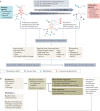The gut microbiome as a modulator of healthy ageing
- PMID: 35468952
- PMCID: PMC9035980
- DOI: 10.1038/s41575-022-00605-x
The gut microbiome as a modulator of healthy ageing
Abstract
The gut microbiome is a contributory factor in ageing-related health loss and in several non-communicable diseases in all age groups. Some age-linked and disease-linked compositional and functional changes overlap, while others are distinct. In this Review, we explore targeted studies of the gut microbiome of older individuals and general cohort studies across geographically distinct populations. We also address the promise of the targeted restoration of microorganisms associated with healthier ageing.
© 2022. Springer Nature Limited.
Conflict of interest statement
F.S. is a cofounder of three campus companies: Alimentary Health Ltd, Tucana Health Ltd (now named 4D Pharma Cork) and Atlantia Food Clinical Trials. P.W.O.T. is a cofounder of 4D Pharma Cork. T.S.G. declares no competing interests.
Figures






References
-
- UN. World Population Ageing 2019: Highlights (ST/ESA/SER.A/430) (United Nations, 2019).
Publication types
MeSH terms
LinkOut - more resources
Full Text Sources
Other Literature Sources

